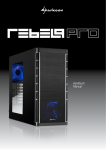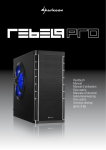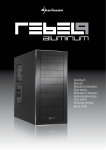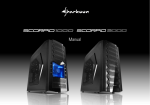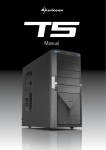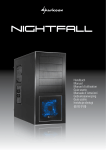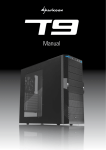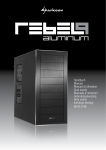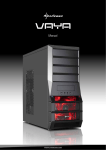Download Sharkoon Bandit
Transcript
manual Content 1. Features 1. 2. 3. 4. 5. 6. 7. 8. 9. 10. 11. 12. 13. • • • • • • • • • • • Features Fan configuration Package contents The case at a glance Installation of a mainboard Installation of a PSU Installation of a HDD Installation of an optical device Installation of an additional 3.5" device Installation of an add-on card The pre-installed fans Installation of additional fans / optimized airflow The docking station for SATA HDDs in the case’s top panel ATX case 5x 5.25" drive bays (external) 3x 3.5" drive bays (internal) Top I/O with 2x USB2.0, 1x eSATA, 1x headphone and 1x microphone connector, power and reset button as well as LEDs for power and HDD activity Installed SATA docking station in case top (for 2.5" and 3.5" HDDs) Pre-installed card reader with USB2.0 connector (supported card formats: SD/SDHC, MS, MMC, CF) 7 slots for add-on cards Mesh front panel for optimized cooling Quick fasteners for optical drives Dimensions: 485 x 485 x 200 mm (L x H x W) Weight: ~ 6.6 kg 2. Fan configuration Case front 1x 120mm LED fan with 3-pin and 4-pin connector (pre-installed) Dear customer! Side panel 2x 140mm or 2x 120mm fans (optional) Back side of case 1x 120mm or 1x 80mm fan (optional) Congratulations for purchasing one premium quality SHARKOON product. For a long life time and to take full advantage of this product we recommend that you read this manual completely. Top panel 1x 180mm LED fan (pre-installed) Have a good time with our product! SHARKOON Technologies 3. Package contents • ATX-case “Bandit” (1x 120mm LED fan in the case front, 1x 180mm LED fan in the top panel and card reader pre-installed) • Accessory kit: Stand-offs for mainboard bandit Screws for drive/ Screws for HDD/ mainboard mounting PSU mounting Screws with coarse thread A View from above A B B C Quick fasteners for optical drives (pre-installed) Thumb screws (pre-installed) b a Mounting frame for 3.5" devices 5.25" bezel with opening for 3.5" devices c d A – Top I/O a – Reset button b – 1x eSATA connector and c – 2x USB2.0 connectors d – Power button e – SATA docking station f – LEDs g – 1x headphone and microphone connector Lock attachment (A), speaker (B) and plastic case feet (black, self-adhesive / C) Note: If you are missing any of the items listed above, please contact customer service via e-mail at [email protected] or call + 49 (0) 6403 – 775 6100. e f B – Pre-installed 180mm LED fan g 4. The case at a glance Front view Side view (closed/left) A A B A – B – C – Pre-installed card reader 5.25" mounting bays behind the front bezel: pre-installed 120mm LED fan A – Fan brackets (120 mm and 140 mm) C bandit Side view (opened/left) Back side view E A E B A A – B – C – D – E– B C C D E A – B – C – D – E– Mounting bays for 5.25" devices Mainboard mounting panel Installation opening for CPU coolers Quick fasteners for ODDs Removable HDD cage D E Opening for I/O shield Fan bracket for 80mm or 120mm fan Slot bezels PSU bracket Thumb screws E The internal cables and connectors A B C a b E E F bandit D A – Card reader USB connector B – Audio connectors for: a – HD Audio b – AC’97 C – Connectors for (f.l.t.r): Power Switch Reset Switch Power LED + HDD LED Power LED – D – USB connector of the USB front hub E – eSATA connector F – 3-pin and 4-pin fan connector Note: For more information on how to install the intended devices, refer to their respective documents. 3. Remove the mainboard and screw the stand-offs into the respective drillings of the mounting panel (fig. 3). 5. Installation of a mainboard 1. Open the case by loosening the thumb screws on the case’s back side and removing the left side panel. Lay down the case sidewise on an even surface. (Stand-offs) 2. The mainboard’s mounting panel inside the case provides various drillings to fix the stand-offs (fig. 1). fig. 3 fig. 1 4. Press the I/O shield (delivered with the mainboard) into the I/O shield opening in the case’s back side. The mainboard contains special screw openings (fig. 2). 5. Place the mainboard back onto the stand-offs and screw the mainboard to them (fig. 4). fig. 2 Place the mainboard to the mounting panel. A stand-off must be screwed into every drilling of the mounting panel visible through the mainboard’s screw openings. fig. 4 bandit (Screws for mainboard mounting) 6. Plug the connectors of the case’s front bezel to the respective connectors of the mainboard (also refer to your mainboard’s manual for further information). Note: The eSATA cable connected to the front eSATA connection should not exceed 50 cm of length otherwise transmission errors may occur! With premium quality eSATA cables this maximum length may be exceeded. 7. Installation of a HDD 1. Remove the case’s right side panel. 2. Remove the front bezel’s fixation screws on both sides (fig. 7). 6. Installation of a PSU 1. Set up the case in front of you and put the PSU from the inside against the PSU bracket on the case’s back side (fig. 5). fig. 7 3. Remove the case’s front panel by gently dragging it towards you (fig. 8). fig. 5 2. Screw the PSU to the case from the outside (fig. 6). (Screws for PSU mounting) fig. 8 fig. 6 bandit 4. Loosen the attachment screws of the HDD cage (fig. 9). fig. 11 7. Slide the HDD cage back into the case and screw it from both sides (fig. 12 and 13). fig. 9 5. Drag the HDD cage to the front and out of the case (fig. 10). fig. 12 fig. 13 fig. 10 6. Slide the HDD into a mounting bay of the HDD cage and fixate it from both sides (fig. 11). (Screws for HDD mounting) 8. Connect the HDD to the power supply and the mainboard. bandit 8. Installation of an optical device 3. Slide the optical drive into the case’s drive bay (fig. 17). (1. Remove the case’s front panel by gently dragging it towards you (fig. 14).) fig. 17 4. Attach the optical device from both sides using the quick fasteners (fig. 18). fig. 14 2. Dismantle the 5.25" front bezel from the mounting bay in which you intend to install the drive by loosening its screws and pushing the bezel to the inside (fig. 15). Remove the quick fasteners (fig. 16). fig. 18 Note: If you intend to transport the case we recommend securing (additionally) the installed drives: fig. 15 fig. 16 (Carefully take out an optionally present metal bezel covering the 3.5" drive bay by using a gripper.) (Screws for 5.25" drive mounting) 5. Connect the optical drive to the power supply and the mainboard. (Put the front bezel back onto the case.) bandit 9. Installation of an additional 3.5" device 3. Place the 3.5" device into the mounting frame for 3.5" devices and screw it to the mounting frame from both sides (fig. 22). (1. Remove the case’s front panel by gently dragging it towards you (fig. 19.) (Mounting frame for 3.5" devices) fig. 19 2. Dismantle the 5.25" front bezel from the mounting bay in which you intend to install the drive by loosening its screws and pushing the bezel to the inside (fig. 20). Remove the quick fasteners (fig. 21). fig. 22 4. Slide the mounting frame with installed 3.5" device into the case’s drive bay (fig. 23) and attach it to the drive bay from both sides using the quick fasteners for ODDs (fig. 24). fig. 20 fig. 21 (Carefully take out an optionally present metal bezel covering the drive bay by using a gripper.) fig. 23 fig. 24 Note: If you intend to transport the case we recommend securing (additionally) the installed drives. bandit 5. Connect the 3.5" device to the power supply and the mainboard. 6. Screw the 5.25" bezel with 3.5" opening into the front panel and place it back onto the case. (5.25" bezel with 3.5" opening) 10. Installation of an add-on card 1. Press the slot bezel out of its attachment (fig. 25). fig. 26 11. The pre-installed fans 1. The pre-installed case fans provide a 4-pin PSU connector and a 3-pin mainboard plug each. 2. Connect one of both plugs to either the respective PSU or (to control the fan speed via the mainboard) the matching mainboard connector. 12. Installation of additional fans / optimized airflow 1. Place the fan against the respective bracket from the inside (e.g. the back side / fig. 27). fig. 25 2. Insert the add-on card into the mainboard’s respective slot and screw it to the case (fig. 26). (Screw with coarse thread) fig. 27 bandit 13. The docking station for SATA HDDs in the case’s top panel 2. Screw the fan to the attachment from the outside (fig. 28). 1. Connect the docking station’s internal SATA plugs to the respective connectors of the mainboard and the power supply (fig. 29). A B A – SATA power connector (15-pin) B – SATA data connector (7-pin) fig. 29 2. Insert either a 2.5" or a 3.5" SATA HDD into the SATA docking station (fig. 30 and fig. 31). fig. 28 3. Connect the fan’s power plug to the PSU or the mainboard. Note: While installing fans make sure that (cool) air is taken in on the case’s front side/bottom and blown out on its back side/top. The PC components with the highest heat development should be placed directly within the airflow. fig. 30 bandit fig. 31 Legal disclaimer: As a continuing policy of product improvement at SHARKOON, the design and specifications are subject to change without prior notice. National specifications may vary. All rights reserved especially (also in extracts) for translation, reprinting, reproduction by copying or other technical means. Infringements will lead to compensation. All rights reserved especially in case of assignation of patent or utility patent. Means of delivery and technical modifications reserved. Disposal of your old product Your product is designed and manufactured with high quality materials and components, which can be recycled and reused. When this crossed-out wheeled bin symbol is attached to a product, it means the product is covered by the European Directive 2002/96/EC. Please be informed about the local separate collection system for electrical and electronic products. Please act according to your local rules and do not dispose of your old products with your normal household waste. The correct disposal of your old product will help prevent potential negative consequences to the environment and human health. © SHARKOON Technologies 2010 www.sharkoon.com bandit












